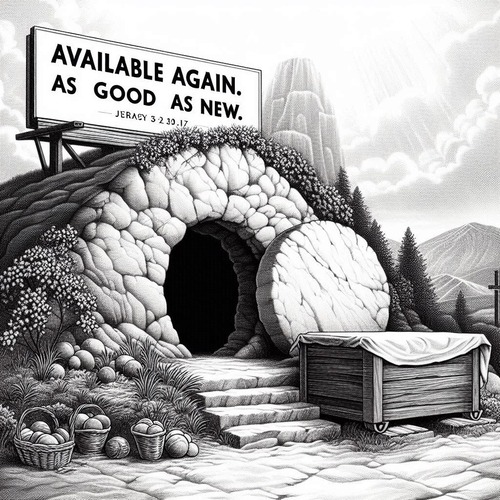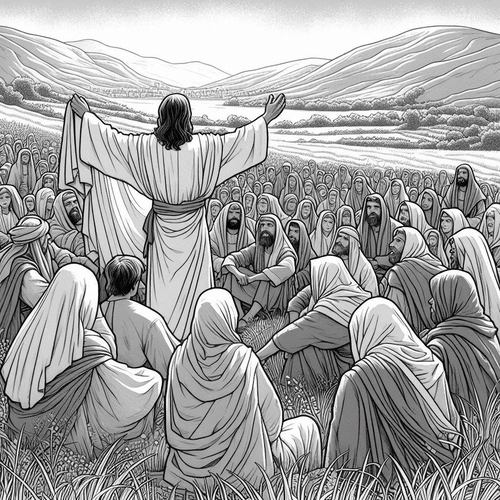Joshua & Yeshua: Exploring the Name and Life Connections
When we encounter names in Scripture, they often carry profound theological significance. None more so than the name shared by two pivotal Bible figures—Joshua, the successor to Moses, and Jesus Christ, whose Hebrew name Yeshua reveals a connection too remarkable to be coincidental. This exploration into Bible typology highlights how the Old Testament Joshua prefigures the coming Messiah in both name and deed.
JOSHUA & YESHUA: DIVINE INTENT IN SHARED NAME
The Hebrew name (Yehoshua or Joshua) literally means “Yahweh is salvation” or “the LORD saves.” This same name, in its Aramaic form “Yeshua,” was given to Christ. This connection is far from accidental—it’s divinely orchestrated.
In Numbers 13:16, we find Moses deliberately changing Hoshea’s name to Joshua. This transformation from “salvation” to “Yahweh is salvation” foreshadows the greater Joshua to come. The angel’s instruction to Joseph in Matthew 1:21 echoes this theme: “You shall call his name Jesus (Yeshua), for he will save his people from their sins.” Both names proclaim the same essential truth: salvation comes from the LORD alone.
JOSHUA AS A TYPE OF YESHUA: KEY PARALLELS
The typological connections between Joshua and Jesus extend far beyond their shared name:
- Successor to Moses: Just as Joshua succeeded Moses (who represents the Law), Christ fulfils the Law and leads believers into a new covenant relationship. This connection is deepened by Moses’ own prophecy in Deuteronomy 18:15, “The LORD your God will raise up for you a prophet like me from among you, from your brothers—it is to him you shall listen.” While Joshua partially fulfilled this role, Jesus Christ is the ultimate prophet like Moses whom God’s people must heed.
- Leading to the Promised Land: Joshua guided Israel into their physical inheritance in Canaan; Christ leads His people into their spiritual inheritance.
- Mediatorial Role: Both served as mediators between God and His people—Joshua representing Israel before God, and Christ as “the one mediator between God and men” (1 Timothy 2:5).
- Victory and Rest: Joshua conquered earthly enemies to provide rest in the land; Christ conquers sin and death to provide eternal rest for believers.
- Covenant Renewal: Both called God’s people to renewed covenant commitment.
TYPOLOGICAL EVENTS IN JOSHUA’S LIFE
Several events in Joshua’s life powerfully foreshadow Christ’s ministry and work:
Crossing the Jordan (Joshua 3): Just as Joshua led Israel through the waters of Jordan into the Promised Land, Christ’s baptism in the same river initiated His public ministry and foreshadowed how He would lead His people through the waters of baptism into new life.
The Commander of the LORD’s Army (Joshua 5:13-15): Joshua’s encounter with this mysterious figure—before whom he falls in worship—represents a Christophany, a pre-incarnate appearance of Christ. This profound moment was, in essence, a meeting between Joshua and Yeshua (his namesake), where the temporal leader encounters the eternal Commander. The divine figure’s instruction for Joshua to “take off your sandals, for the place where you are standing is holy” mirrors the burning bush encounter with Moses, highlighting the divine nature of Joshua’s mission and the One who truly leads Israel’s armies.
Rahab’s Scarlet Cord (Joshua 2): This vivid symbol of protection prefigures Christ’s blood that saves those who trust in Him, regardless of their past. Just as Rahab—a Gentile—was incorporated into Israel, Christ’s salvation extends to all nations.
The Battle of Jericho (Joshua 6): This episode powerfully pictures the church: militant yet triumphant. The Israelites didn’t win through conventional warfare but through faith and obedience, marching as God commanded and trusting His plan. Similarly, the church advances not through worldly power but divine strength. The walls of Jericho remind us that our battles aren’t ours but God’s—a theme that resonates throughout Scripture and culminates in Christ’s ultimate victory over sin and death.
Joshua’s Long Day (Joshua 10:12-14): Joshua’s authority over the sun and moon demonstrated supernatural power over creation, foreshadowing Christ’s authority over natural elements as seen in His calming the storm and other miracles. Remarkably, this cosmological sign finds its inverse parallel at Christ’s crucifixion, when “from the sixth hour there was darkness over all the land until the ninth hour” (Matthew 27:45). While Joshua commanded extended light for victory, darkness fell at midday during Jesus’ death—both supernatural events revealing divine intervention and victory. Joshua’s victory came through extended light; Yeshua’s greater victory paradoxically came through temporary darkness that gave way to the eternal light of resurrection.
“AS FOR ME AND MY HOUSE”: THE REFORMED PERSPECTIVE
Joshua’s famous declaration in Joshua 24:15—“As for me and my house, we will serve the LORD”—resonates deeply within Reformed theology. This statement reflects several key principles:
Covenant Headship: Joshua speaks representatively for his household, embodying the biblical concept of family solidarity under a covenant head. This prefigures Christ as the head of His covenant people, the church.
Decisive Faith: Joshua calls for a decisive commitment without compromise—“choose this day whom you will serve.” This mirrors the gospel’s call to radical, decisive faith in Christ alone.
Covenant Faithfulness: Reformed scholars emphasise how Joshua’s declaration reflects intergenerational covenant faithfulness, with family discipleship at its centre—a pattern that continues in the New Testament’s household baptisms and family discipleship model.
Sovereign Grace in Response: Though Joshua calls for decision, Reformed theology recognises that even our choosing God comes as a response to His prior choosing of us—just as Israel’s ability to serve God came only after His redemptive acts on their behalf.
Battles Belong to the Lord: Just as Joshua led the people to serve the Lord and face battles with the understanding that they were the Lord’s battles, so too the church is called to serve the Lord faithfully while trusting our spiritual conflicts are ultimately His. This theme connects directly to the Jericho episode and extends through Scripture to Paul’s reminder that “we wrestle not against flesh and blood” (Ephesians 6:12) and that “the weapons of our warfare are not of the flesh” (2 Corinthians 10:4). Our service to the Lord involves faithful obedience while relying on His strength rather than our own.
CONTEMPORARY APPLICATION
The typological connections between Joshua and Jesus enrich our understanding of Scripture’s unified redemptive narrative. They remind us that:
- Our salvation is never accomplished through our own strength but through “Yahweh’s salvation”
- God’s promises find their ultimate fulfillment in Christ
- Like Israel under Joshua, the church advances through faith and obedience, not worldly power
- Family discipleship remains central to covenant faithfulness
- We serve a God who works throughout history to accomplish His redemptive purposes
CONCLUSION: JOSHUA & YESHUA
The convergence of name and narrative between Joshua and Yeshua (Jesus) offers a striking example of divine intentionality in Scripture. Through Joshua, God not only delivered Israel into the Promised Land but also painted a living portrait of the greater Joshua to come—Jesus Christ, who leads His people not merely into Canaan but into eternal life.
As we reflect on Joshua’s bold declaration, “As for me and my house, we will serve the LORD,” may we recognise our own call to covenant faithfulness under the headship of Christ, the ultimate Joshua, who perfectly accomplishes what the first Joshua could only prefigure—complete salvation for God’s people.
JOSHUA & YESHUA—RELATED FAQs
How do Reformed scholars view the Joshua/Jesus typology differently from other theological traditions? Reformed scholars tend to emphasise the covenant framework more strongly than other traditions, seeing Joshua as part of God’s unfolding covenant plan that finds fulfillment in Christ. They particularly focus on Joshua’s role as a covenant mediator who applies what Moses established, similar to how Christ mediates and applies the new covenant. Reformed theology also places greater emphasis on Joshua’s leadership as demonstrating God’s sovereign grace working through human instruments.
- Did the early church fathers recognise the typological connection between Joshua and Jesus? Indeed, many early church fathers wrote extensively about Joshua as a type of Christ, with Justin Martyr, Origen, and Augustine being particularly noteworthy contributors. Justin Martyr emphasised Joshua’s name change foreshadowed Christ, while Augustine elaborated on how Joshua’s military campaigns prefigured Christ’s spiritual victories. Their interpretations laid groundwork for typological readings that continue to influence biblical scholarship today.
- How does Joshua’s installation of memorial stones connect with Christ’s work? Joshua’s establishment of memorial stones (Joshua 4:1-9) served as physical reminders of God’s faithful deliverance, creating intergenerational teaching opportunities. Scholars like Edmund Clowney have connected these stones to the sacraments of baptism and the Lord’s Supper, which similarly serve as covenant signs and seals that remind believers of Christ’s redemptive work. Both the memorial stones and the sacraments function as visible testimonies to God’s invisible grace across generations.
What significance do we find in Joshua’s allocation of tribal inheritances? Reformed theology sees Joshua’s meticulous division of the Promised Land (Joshua 13-21) as foreshadowing Christ’s preparation of eternal dwelling places for believers (John 14:2-3). The detailed boundary descriptions and tribal allotments reflect God’s particular care for His people and His faithfulness to specific covenant promises. This also prefigures the “inheritance imperishable, undefiled, and unfading, kept in heaven” (1 Peter 1:4) that Christ secures for believers.
- How do contemporary scholars interpret the problematic conquest narratives in Joshua through a Christological lens? Contemporary Reformed scholars like Meredith Kline and Tremper Longman frame the conquest as typological of final judgement, with Joshua acting as God’s covenant agent in ways that prefigure Christ’s future role as judge. They emphasise these narratives were never intended as models for Christian behaviour but as historical shadows pointing to eschatological realities. Christ fulfils this typology not by calling His followers to physical warfare but by taking God’s judgement upon Himself at the cross while reserving final judgment for His return.
- What connection exists between Joshua’s cities of refuge and Christ’s work? The cities of refuge established by Joshua (Joshua 20) provided sanctuary for those who had accidentally killed someone, protecting them from blood vengeance. Reformed theologians like John Calvin viewed these cities as types of Christ, who is our refuge from divine judgement. Just as these cities were accessible to both Israelites and foreigners, Christ offers salvation to both Jews and Gentiles, providing shelter to all who “flee for refuge” (Hebrews 6:18) to Him.
How does the incomplete conquest under Joshua relate to Christ’s kingdom? Despite Joshua’s leadership, the conquest of Canaan remained incomplete (Joshua 13:1-7), with many enemies still present in the land. Reformed scholars view this as foreshadowing the “already but not yet” nature of Christ’s kingdom—inaugurated but not yet consummated. This pattern reminds believers that while Christ has secured decisive victory over sin and death, we still battle against remaining sin and await the final consummation when all enemies will be completely vanquished (1 Corinthians 15:25-26).
JOSHUA & YESHUA—OUR RELATED POSTS
- Types of Christ and His Cross in the Old Testament
- A Prophet Like Moses: How Jesus Fulfilled the Deuteronomy 18 Test
- Who Is Isaiah 53’s Suffering Servant: The Messiah or Israel?
- How the Torah Points to Christ: Prophecies, Patterns, Promises…
- The Tabernacle: How Does It Point to Christ’s Incarnation?
- Types of Christ and His Cross in the Old Testament
- Jesus in the Old Testament: Glimpses of the Coming Saviour
- Jesus in the Jewish Festivals: From Shadow to Substance
Editor's Pick

The Throne-Room Vision: Who Did Isaiah See?
The scene is unforgettable: Isaiah stands in the temple, and suddenly the veil between heaven and earth tears open. He [...]

The Angel of the Lord: Can We Be Certain It Was Christ All Along?
Throughout the Old Testament, a mysterious figure appears: the Angel of the LORD. He speaks as God, bears God’s name, [...]
SUPPORT US:
Feel the Holy Spirit's gentle nudge to partner with us?
Donate Online:
Account Name: TRUTHS TO DIE FOR FOUNDATION
Account Number: 10243565459
Bank IFSC: IDFB0043391
Bank Name: IDFC FIRST BANK






